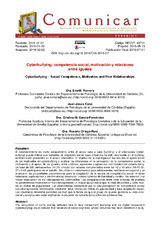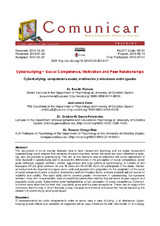Mostrar el registro sencillo del ítem
Cyberbullying: competencia social, motivación y relaciones entre iguales
| dc.contributor.author | Romera Félix, Eva M. | |
| dc.contributor.author | Cano, Juan J. | |
| dc.contributor.author | García-Fernández, Cristina | |
| dc.contributor.author | Ortega Ruiz, Rosario | |
| dc.date.accessioned | 2016-05-24T10:19:24Z | |
| dc.date.available | 2016-05-24T10:19:24Z | |
| dc.date.issued | 2016 | |
| dc.identifier.issn | 1134-3478 | |
| dc.identifier.uri | http://hdl.handle.net/10396/13609 | |
| dc.description.abstract | El reconocimiento de cierto solapamiento entre el acoso cara a cara (bullying) y el ciberacoso (cyberbullying) puede indicar que variables de cognición social, cuya influencia ha sido reconocida en el bullying, también estén presentes en el acoso cibernético. El objetivo de la investigación fue estudiar el ajuste social de los implicados en cyberbullying y analizar las diferencias en la percepción de la competencia social, la motivación y el apoyo de los iguales, entre víctimas, agresores y agresores victimizados del cyberbullying. Un total de 505 adolescentes (47,3% chicas) con edades comprendidas entre los 12 y 16 años (M=13.95; DT=1.42) participaron en el estudio. Se utilizaron instrumentos para adolescentes validados en español y se analizaron las propiedades psicométricas para la adaptación de la escala de competencia social. Análisis factoriales exploratorios y confirmatorios mostraron índices óptimos de fiabilidad y validez. Se observó una mayor implicación de los ciberagresores victimizados. Las comparaciones entre roles a través de pruebas no paramétricas mostraron en los ciberagresores un mayor apoyo social que el resto de perfiles y altos niveles en metas de popularidad. Las cibervíctimas destacaron por su alta percepción de competencia social. Los ciberagresores victimizados mostraron altos niveles de metas de popularidad y baja aceptación social. Los resultados obtenidos permiten concluir que la forma en que el grupo de iguales gestiona su vida emocional y social puede estar explicando la situación de cyberbullying entre los adolescentes. | es_ES |
| dc.description.abstract | The recognition of some overlap between face to face harassment (bullying) and via digital harassment (cyberbullying) could indicate that variables of social cognition, whose influence has been identified in bullying, also are present in cyberbullying. The aim of this research was to determine the social adjustment of roles involved in cyberbullying and to analyze the differences in the perception of social competence, social goals and peer support, between victims, aggressors and bully-victims of cyberbullying. A number of 505 teenagers (47.3% girls) between 12 and 16 years old (M=13.95, SD=1.42) participated in the study. Validated instruments for Spanish teenagers were used and psychometric properties for the adaptation of the scale of social competence were analyzed. Exploratory and confirmatory factor analysis showed optimal scores of reliability and validity. The cyber bully-victims showed greater involvement in cyberbullying. Comparisons between roles with nonparametric tests showed that cyberbullies had the highest levels of peer support and popularity social goals. Cybervictims were highlighted by a high perception of social competence. Cyberbully- victims were described by their high popularity goals and low peer acceptance. These results support the conclusion that the way in which the peer group manages its emotional and social life may be explaining the situation of cyberbullying among teenagers. | es_ES |
| dc.format.mimetype | application/pdf | es_ES |
| dc.language.iso | spa | es_ES |
| dc.rights | https://creativecommons.org/licenses/by-nc-nd/4.0/ | es_ES |
| dc.source | Romera, E.M., Cano, J. J., García-Fernández, C., & Ortega-Ruiz, R. (2016). Cyberbullying: competencia social, motivación y relaciones entre iguales. Comunicar, 48 | es_ES |
| dc.subject | Adolescencia | es_ES |
| dc.subject | Competencia social | es_ES |
| dc.subject | Conductas de riesgo | es_ES |
| dc.subject | Contexto educativo | es_ES |
| dc.subject | Investigación | es_ES |
| dc.subject | Motivación social | es_ES |
| dc.subject | Popularidad | es_ES |
| dc.subject | Relaciones sociales | es_ES |
| dc.subject | Adolescence | es_ES |
| dc.subject | Social competence | es_ES |
| dc.subject | Risk behaviors | es_ES |
| dc.subject | Educational context | es_ES |
| dc.subject | Research | es_ES |
| dc.subject | Social motivation | es_ES |
| dc.subject | Popularity | es_ES |
| dc.subject | Social relationships | es_ES |
| dc.title | Cyberbullying: competencia social, motivación y relaciones entre iguales | es_ES |
| dc.title.alternative | Cyberbullying: Social Competence, Motivation and Peer Relationships | es_ES |
| dc.type | info:eu-repo/semantics/article | es_ES |
| dc.rights.accessRights | info:eu-repo/semantics/openAccess | es_ES |


